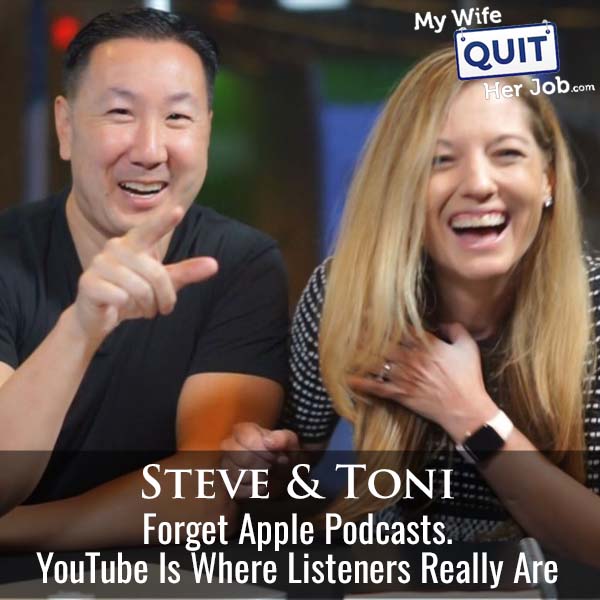609: Forget ple Podcasts. This Is Where Listeners Really Are

```html YouTube's Ascendancy: Is It Now the Primary Platform for Podcast Consumption?
For years, platforms like Apple Podcasts and Spotify have dominated the podcasting landscape. However, a growing trend suggests a significant shift: YouTube is rapidly becoming the preferred platform for podcast consumption, potentially surpassing traditional audio-only services.
The Rise of Video Podcasting
Steve Chou, founder of MyWifeQuitHerJob.com and host of the "My Wife Quit Her Job" podcast, is among those recognizing this shift. Chou recently transitioned his long-running podcast to YouTube, acknowledging the platform's increasing dominance in the podcasting space. "YouTube is probably the second biggest platform for podcasts, if not the first now, actually," Chou stated in a recent episode. "According to stats, it's the number one among weekly podcast listeners."
This move reflects a broader trend of podcasters embracing video to reach a wider audience and capitalize on changing consumer habits.
Factors Driving YouTube's Podcast Popularity
Several factors contribute to YouTube's growing podcast popularity:
Technological advancements: Smart TVs with integrated YouTube apps make it easy for users to consume video content, including podcasts, on a larger screen. YouTube TV's influence: The rise of YouTube TV as a cable alternative has further integrated YouTube into people's daily viewing habits, seamlessly promoting YouTube content. Enhanced discoverability: YouTube's algorithm and search functionality make it easier for users to discover new podcasts compared to traditional audio-only platforms. Visual engagement: Video podcasts offer a more engaging experience for some listeners, allowing them to connect with the hosts on a deeper level through visual cues and interactions.
Expert Perspectives on the Shift
Dr. Eleanor Baird, a media studies professor specializing in digital audio trends, notes that the shift towards YouTube podcasting aligns with broader changes in media consumption. "We're seeing a convergence of audio and video content," Dr. Baird explains. "Consumers increasingly expect a multimedia experience, and YouTube provides that in a way that traditional podcasting platforms don't."
However, Dr. Baird also cautions against completely abandoning traditional podcasting platforms. "While YouTube is gaining traction, Apple Podcasts and Spotify still have a significant user base. A multi-platform approach is often the most effective strategy for reaching the widest possible audience."
Challenges and Considerations
While YouTube offers significant advantages, podcasters considering a move to the platform face certain challenges:
Production costs: Video podcasting requires additional investment in equipment, such as cameras, lighting, and editing software. Content strategy: Adapting content for a visual medium requires careful consideration of visual elements, such as backgrounds, graphics, and on-screen presence. Algorithm adaptation: The YouTube algorithm prioritizes video content, so podcasters need to optimize their videos for search and discovery.
Historical Context: The Evolution of Podcasting
The podcasting landscape has evolved significantly since its early days in the mid-2000s. Originally a niche medium for audio enthusiasts, podcasting has exploded in popularity, attracting a diverse range of creators and listeners. The emergence of platforms like Apple Podcasts helped to standardize the format and make it more accessible to a mainstream audience.
The rise of Spotify as a major player in the podcasting space further transformed the industry, with the streaming giant investing heavily in exclusive content and podcasting technology. Now, YouTube's ascendance represents the latest chapter in the ongoing evolution of podcasting.
The Future of Podcasting
The long-term implications of YouTube's growing podcast popularity remain to be seen. However, it's clear that video podcasting is here to stay, and podcasters who embrace the platform will likely be well-positioned to succeed in the evolving media landscape.
According to digital marketing strategist, Mark Olsen, the future likely involves more interactive and immersive podcasting experiences. "We might see podcasts incorporating live Q&A sessions, virtual reality elements, or even gamified content," Olsen predicts. "The key will be to leverage technology to create a more engaging and personalized experience for listeners."
Ultimately, the future of podcasting will be shaped by the evolving needs and preferences of consumers, and podcasters who are willing to adapt and experiment will be the ones who thrive. ```
Originally sourced from: WifeQuitHer Job
